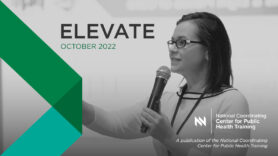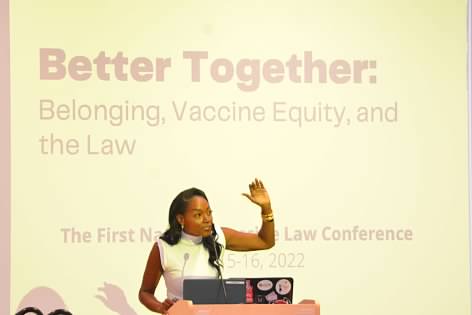Belonging In The Workplace
- By: National Coordinating Center for Public Health Training
- Date
On average, Americans spend about a third of their lives at work. For some, that means one-third of your day and life you feel out of place and try to keep up a facade of who you think you should be. A recent Better Up study found that when employees feel a sense of belonging, organizations see a 75 percent reduction in sick days, a 56 percent increase in performance, and a 50 percent reduction in turnover.
“All of us no matter our race, gender, gender identity, age, ethnicity, background—we all have a need to feel a sense of belonging,” said Montrece McNeill Ransom, director of the National Coordinating Center for Public Health Training (NCCPHT). “Belonging at its core is a basic human need. All of us have an innate need to feel that sense of belonging.”
Belonging in the workplace means having a culture where employees and the workforce feel a sense of psychological safety. A feeling of belonging allows people across the spectrum of diversity to show up as their true selves and contribute their full energy to the mission.
According to Maslow’s hierarchy of needs, humans must meet the need of belonging to achieve a healthy level of self-esteem. Ransom stresses the development of self-confidence has to happen for us to reach our full potential.
“That’s how important belonging is. It is the gateway to human potential,” said Ransom.
Ransom said belonging means an employee can show up as their authentic self, but in her experience, that’s easier said than done.
Ransom said belonging will look different for everyone. However, broadening how we approach our work with this understanding creates opportunities for people to grow within public health. If an environment is psychologically safe for one group, that doesn’t mean it is psychologically safe for all people. We often call belonging a feeling or a sense, but in reality, it’s an experience.
“For me, belonging at this phase in my career means being able to talk about being a Black woman in public health,” said Ransom. “It means not shying away from talking about the experience of looking around and seeing few people who reflect and understand what that brings to the table.”
Another element of belonging is being able to see a future for yourself. Oftentimes, that means being able to see and hear people like yourself at high levels within the organization. Ransom said there need to be clear opportunities for growth that are attainable and within reach.
In Ransom’s experience, far too many people of color have been told early in their careers not to focus on minority health because they’ll be stuck in that box for good. They are told to establish themselves as experts across all elements of public health first. Essentially having to work twice as hard before they are able to have their voices heard and respected as individual public health professionals. This advice runs counter to the reality that many people of color have been drawn to the field by their own painful, personal experiences with the public health and health care systems.
Creating a sense of belonging also means different ways of approaching life, which includes neurodiversity or diversity of thought. Ransom said, “Leadership needs to reflect a wide range of approaches to the challenges they face because there is no one way to do things.” Ransom adds, “We [public health] desperately need the innovation that comes from a diversity of thought–and places where people are comfortable voicing those potential divergent- but likely brilliant- ideas.”
“If you don’t see yourself as growing within an organization or in a field, there is a challenge to your sense of belonging,” Ransom explained. “If there is no next step or something you’re working toward, that creates a challenge to your sense of belonging.”
Adverse effects of not belonging
A lack of belonging can lead to burnout for the individual and a lack of progress for the entire field of public health. Ransom believes it is essential for us to recognize and think about our individual impact, which means giving each voice from every background its due.
“If our lived experiences, our unique individual talents, and our backgrounds aren’t looked at as assets, we neglect the bigger picture of the people we say we serve, said Ransom. “Public health cannot accomplish its mission if a diversity of voices is not given credence.”
According to Ransom, a lack of belonging could lead to feelings of depression, anxiety, and loneliness. It doesn’t just affect the individual; it can also mean lower productivity, burnout, or so-called ‘quiet quitting,’ where someone slowly does less and less of their work over time without actually leaving their position.
When someone doesn’t see how they belong at work, they can be afraid of making the slightest mistake and less likely to speak up for themselves or their ideas. Ransom has some suggestions for people who don’t feel like they belong at work. She said it starts with doing the internal work on ourselves as individuals.
“I’ve come to learn that if we don’t accept ourselves, our sense of belonging will always be constrained,” she said. “But belonging is a two-way street.”
Creating a sense of belonging
One of the critical roadblocks to creating this better work environment is not having systems and structures in place that enable people to show up as their authentic selves. Ransom wants people to be able to “come as they are” so their energy is spent on the work and the mission. She believes trying to fit the mold for what many think a public health practitioner is supposed to look and sound like is exhausting. That’s part of why Ransom created a five-step SPARK Model for Fostering Belonging that works as a framework for action.
- Make SPACE for authenticity. It takes commitment, intention, and courage for leaders and organizations to create environments that are conducive to authenticity and humanity—do it anyway. This necessarily includes ensuring the workforce is seen and heard.
- Learn to be PC. No, not politically correct. Instead, be Professionally Competent, People-Centered, and Personally Compassionate. If it is not a difference that makes a difference (financially, ethically, or legally), then what’s the difference?
- Develop an ACCEPTANCE mindset. Remember, no one wants to be tolerated, othered, or tokenized. Accept differences as assets.
- Sponsor and encourage REPRESENTATION. Purposely include more people from historically excluded populations at the table and in positions of power; this is one of the best ways to recruit more diverse candidates across the board.
- KNOW your biases, both covert and overt. We all have them. Learn what yours are and do the work to overcome them.
“The reality is that our interests, motivation, health, and happiness are inextricably tied to the feeling that we belong to a greater community that may share common interests, aspirations, or mission,” Ransom said.
She encourages employers to create engaging diversity, equity, and inclusion taskforces or work groups with funding, decision making power. She also challenges people to ask themselves if they are improving the environment and creating a more welcoming workplace for a wider range of people. According to Ransom, belonging is, at its core, about human connection. It is also about being empathetic enough to respect individual boundaries.



 Subscribe To Our Communications
Subscribe To Our Communications